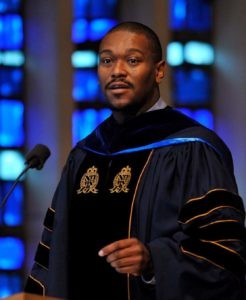The United States needs a “movement of heart and spirit” to address a moral crisis that places the country in danger of “losing its soul,” warned the leader of a seminary institute dedicated to Black church studies.
In an opinion piece published in The Courier Journal, Louisville’s daily newspaper, Lewis Brogdon, director of Baptist Seminary of Kentucky’s Institute for Black Church Studies, identified hate as the central issue confronting the nation.

Lewis Brogdon
“Hate is the undercurrent and common thread animating the American crisis,” Brogdon wrote. “It guides how we think about and interact with others.” Brogdon’s article appeared in the Sunday, June 6, print edition of the newspaper and in an abbreviated version available online.
An example of pervasive hate, he noted, is the “othering” of individuals whose backgrounds are different than one’s own. Othering results in indifference, oppression and violence toward people from different races, nationalities, social classes and political parties, he said. Othering, he added, manifests itself in both personal relationships and public policy making.
In previous times of national peril, presidents have recognized the “spiritual significance” of their office, Brogdon said. He mentioned Abraham Lincoln, Franklin Roosevelt and John Kennedy as presidents who rose to the occasion. “These leaders understood that seminal moments require more than political leadership, more than politics as usual.”
President Joe Biden’s vision of leadership includes this broader mission of the presidency, he said. Brogdon observed that Biden advocated this perspective during the 2020 Democratic National Convention when as a candidate he said, “This campaign isn’t just about winning votes. It’s about winning the heart and, yes, the soul of America.”
“Politics cannot fix a nation with a broken soul.”
The problems America faces cannot be solved through political solutions alone, Brogdon stressed: “Politics and public policy are both vital for the future of America, but politics cannot fix a nation with a broken soul. Hate will only worsen our social predicament and hasten the complete loss of our nation’s soul unless we reimagine our public life together.”
Brogdon suggested the wisdom imparted by civil rights leader Martin Luther King Jr. could be a starting point to repair America’s divisions.
“Though widely known as the leader of the Civil Rights Movement and champion of nonviolent direct action, King’s ideas on hate and national character are not given enough attention,” Brogdon said. “For some reason, our leaders stop talking about the importance of a nation’s character, which was a point King brought consistent attention to.”
If King were alive in 2021, Brogdon speculated King would urge the creation of a “movement that repudiates hate” and insist the nation’s character be addressed.
Without measures such as these, Brogdon predicted progress will not be made on pressing issues confronting the country. “We cannot fix our crumbling infrastructure, bridge the partisan divide, correct systemic racism and address poverty until we come to grips with hate.”
“We cannot fix our crumbling infrastructure, bridge the partisan divide, correct systemic racism and address poverty until we come to grips with hate.”
Brogdon, who also serves as a research professor of Black church studies and preaching at BSK, is the first director of the seminary’s Institute for Black Church Studies. The institute, which was announced in January, was created with a multi-year $750,000 grant from the Eula Mae and John Baugh Foundation.
The institute is housed at the historically Black Simmons College of Kentucky in Louisville, which is home to one of BSK’s two campuses. The other campus is at Georgetown College.
In an interview, Brogdon said the column he wrote is indicative of the institute’s priorities. African American leaders are rightly concerned with the legacy of slavery and systemic racism, and their input is needed for the country to navigate these issues.
These issues will be part of the institute’s work, he said, but he sees the institute adding a new dimension to the national discussion about broader political and moral issues.
“As director of the new institute, I feel a moral obligation to start a different kind of conversation about what’s ailing America,” he said. “This is just the beginning of the cutting-edge work the institute will take up nationally.”
Related articles:
Kentucky seminary receives Baugh Foundation grant to start Institute for Black Church Studies


